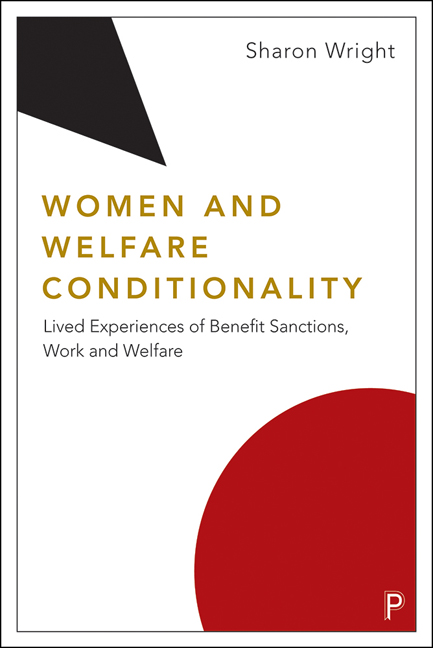Book contents
- Frontmatter
- Contents
- List of figure, tables and charts
- List of abbreviations
- Acknowledgements
- one What does work-based welfare reform mean for women?
- two Re-theorising conditional welfare as gendered lived experience and street-level practice
- three Policy context: the hidden gendered impacts of conditional welfare reforms
- four Rewriting retirement as ‘work experience’: older women’s gendered encounters with the work ethic
- five Crushing conditionality: women living through heavily enforced work-related conditionality
- six In the shadow of sanctions: disciplining women and children for violating male-defined work norms
- seven Conclusions
- Appendix 1 The Welfare Conditionality study
- Appendix 2 Sanctions overviews
- Notes
- References
- Index
three - Policy context: the hidden gendered impacts of conditional welfare reforms
Published online by Cambridge University Press: 27 March 2024
- Frontmatter
- Contents
- List of figure, tables and charts
- List of abbreviations
- Acknowledgements
- one What does work-based welfare reform mean for women?
- two Re-theorising conditional welfare as gendered lived experience and street-level practice
- three Policy context: the hidden gendered impacts of conditional welfare reforms
- four Rewriting retirement as ‘work experience’: older women’s gendered encounters with the work ethic
- five Crushing conditionality: women living through heavily enforced work-related conditionality
- six In the shadow of sanctions: disciplining women and children for violating male-defined work norms
- seven Conclusions
- Appendix 1 The Welfare Conditionality study
- Appendix 2 Sanctions overviews
- Notes
- References
- Index
Summary
Margaret cares. Her pebble-dash council house on the outskirts of Glasgow reminds me of my gran’s. It’s sparse-side modest and scrupulously clean. It’s quiet and still. It feels a bit empty, as if she doesn’t quite fill the room. Something, and I soon realise someone, is missing. We drink hot thin tea in floral mugs and she tells me about losing her mum. Margaret lives her life caring for others – bringing up her children, then looking after mum until she died.
In 2014, at the age of 59, Margaret (White Scottish) is near the end of her ‘working life’. She’s up against unfamiliar expectations: claiming for Universal Credit digitally when she has never used a computer before; chasing proof of her rental agreement for the home she’s lived in all her adult life; asking her daughter for food over her six weeks without income, while she waits for her first payment; looking for work 35 hours a week.
These policy realities are alien to Margaret’s lifelong expectations about her role as a mother, a wife and a daughter. Finally, without anyone to care for, Margaret’s identity is abruptly rewritten as an unemployed benefit claimant – a giver who feels like a taker. The hours that had been filled by serving the personal needs of her family were suddenly requisitioned for online job search, indistinguishable from the expectations of the young ablebodied men we spoke to. Margaret was required to adapt immediately to welfare conditionality as if she were unencumbered by grief and ill-health, as if she were fully at ease with IT. Her private caring life is rewritten as a public work responsibility and it is the culture shock of a lifetime.
Introduction
Margaret’s life is a life lived caring – a biography of family-orientated interdependence that is familiar to many working-class women of her age and a far cry from the individualistic economic rationales of welfare reform. Margaret’s story epitomises the consequences of the policy shift from viewing women primarily as carers to workers. Women in Margaret’s position have their lives mediated textually by employment and social security law. This chapter begins by reflecting on enduring gender inequalities in the paid labour market and persistent patterns of unpaid care.
- Type
- Chapter
- Information
- Women and Welfare ConditionalityLived Experiences of Benefit Sanctions, Work and Welfare, pp. 39 - 67Publisher: Bristol University PressPrint publication year: 2023

